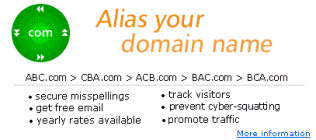|


Domain
Name Aliasing (not to be confused
with Domain Name Forwarding) gives you, the
customer, the ability to register multiple
domain names that all point to one, universal
web site. Each of these newly registered domain
names are referred to as aliases while the
original domain name is referred to as the
parent. For example, Webservio, Inc.'s parent
domain name is webservio.net. If Webservio,
Inc. decided to register the domain name websevrio.com
(note the misspelling) and alias it to webservio.net,
whenever someone typed in the misspelled 'websevrio.com'
into their browser, they would see the webservio.net
web site; while the misspelled domain name
stays in the browser's URL bar.
Domain Aliasing differs
from Domain
Forwarding in that it allows
whatever domain name the user types into
their browser to remain there. Assuming
you had some custom Design/Development script
in your web site that performed varying
actions based on what appeared in the URL
bar of the user's browser, then domain aliasing
is the obvious choice. This feature is also
very beneficial if you wish to prevent "cyber-squatting"
of domain names that pertain to your web
site or business. With every domain name
that you alias to your web site, you increase
the possibility of Internet traffic and
Internet Marketing and reduce the possibility
of your customer's going to your competitor's
web site.
.
| •
Prevent Cyber-Squatting |
• Get rid of Sloppy URL's |
| •
Condense multiple hosting accounts into
one |
•
Give your web site more "girth" |
| |
|
 |


|
|
| |
|
|
|
|
|